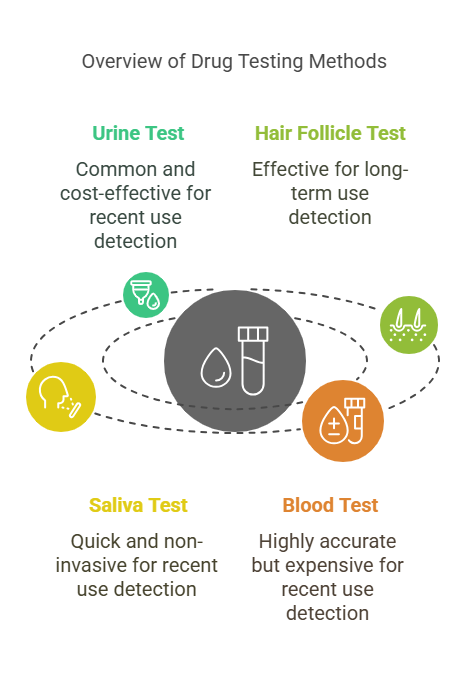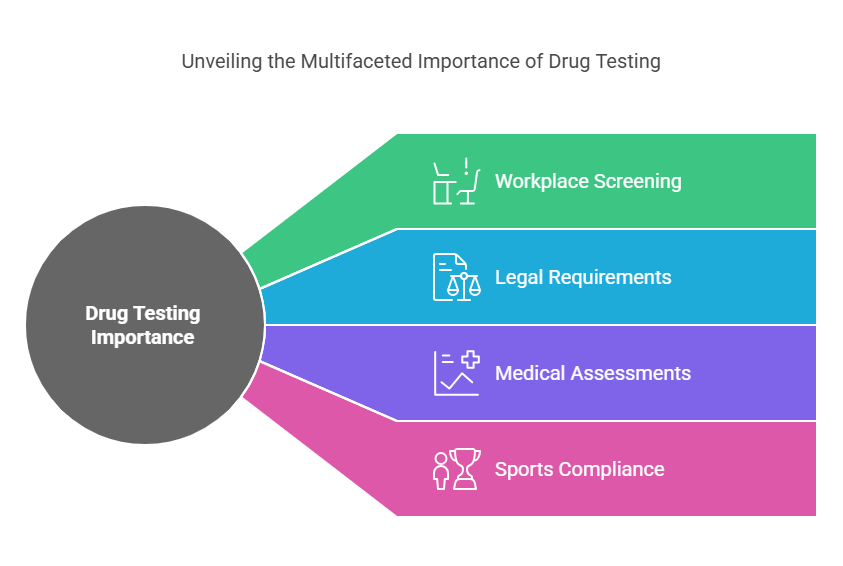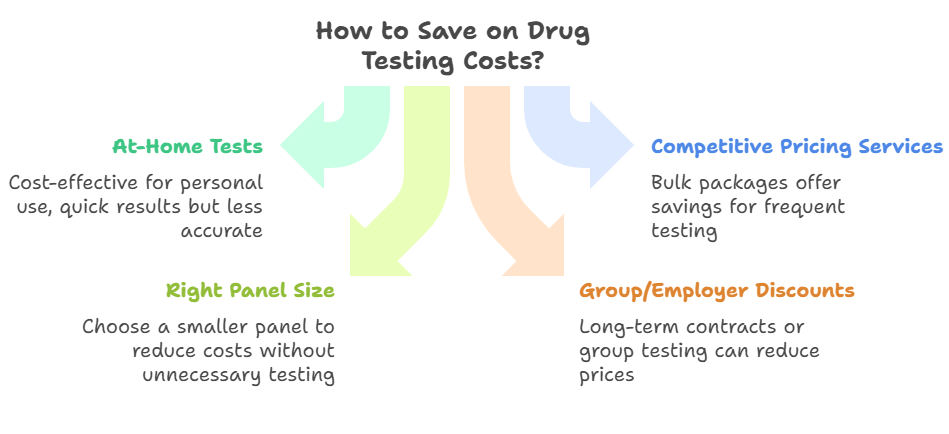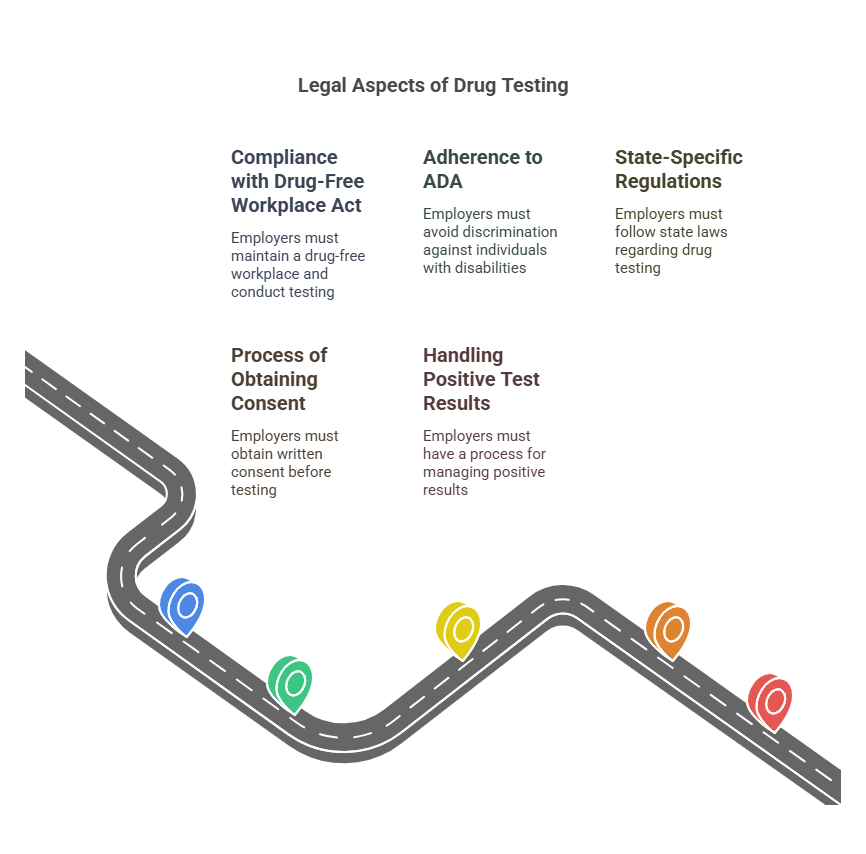Navigating Drug Test Expenses: A Comprehensive Guide

What Is a Drug Test?
A drug test is a scientific procedure used to detect the presence of illegal substances, prescription medications, or over-the-counter drugs in a person’s body. Drug tests are commonly conducted in various settings, including workplaces, medical assessments, legal situations, and sports. The primary goal of drug testing is to maintain safety, ensure compliance with legal requirements, and monitor health.
Drug tests may be required by employers as part of their hiring process or workplace policy, especially in high-risk industries such as healthcare, construction, or transportation. Medical professionals may use drug tests to assess a patient’s use of medications, while law enforcement and legal systems often employ them to meet regulatory or court-mandated requirements.
Types of Drug Tests

Several types of drug tests are available, each with its unique features and costs. Here are the four most commonly used types:
- Urine Drug Test (Most Common)
The urine drug test is the most common and widely used method for detecting drugs. It involves the collection of a urine sample, which is then analyzed in a laboratory for the presence of drugs or their metabolites. This test can detect a variety of substances, including marijuana, cocaine, opiates, and amphetamines. Urine tests are affordable, easy to administer, and typically have a detection window of several days to a week, depending on the substance. - Hair Follicle Test (Long-Term Detection)
Hair follicle testing involves taking a small sample of hair (usually from the scalp) and testing it for drug use over an extended period. This test can detect substances used in the past 90 days. While it is highly effective for identifying chronic or long-term drug use, hair follicle tests are more expensive than urine tests and are typically used for cases where a longer detection window is required. - Saliva Test (Quick and Non-Invasive)
Saliva tests are less common but are increasingly used for on-site or roadside testing. This method involves collecting saliva from the mouth, usually through swabbing the inside of the cheek. It can detect drugs used within a few hours to a couple of days. Saliva tests are non-invasive, quick, and easy to administer, making them popular for immediate screening. - Blood Test (Highly Accurate)
Blood tests are the most invasive type of drug test, as they require a sample of the person’s blood. This test provides the most accurate results, as it detects drugs that are currently active in the bloodstream. However, blood tests are also the most expensive, often used in medical or legal contexts where precision is critical. Blood tests have a short detection window, making them suitable for detecting recent drug use.
Factors Influencing the Cost of Drug Tests
The cost of a drug test can vary widely depending on several factors. These include the type of test being conducted, the substances being tested, the testing provider, and the location of the test. Below are some of the key factors that affect the cost:
1. Type of Test
The type of drug test is one of the most significant factors influencing cost. Typically, urine drug tests are the least expensive, while blood tests are the most costly due to the complexity and equipment required for processing. Here is a general idea of how the costs differ:
- Urine Drug Test: Inexpensive and commonly used.
- Hair Follicle Test: More expensive but provides a longer detection window.
- Saliva Test: Affordable and quick, often used for immediate results.
- Blood Test: The most expensive and accurate, used for specialized cases.
2. Testing Facility
The location and type of testing facility will also impact the cost. Drug tests can be performed in several types of settings:
- Laboratories: Tests performed in specialized labs tend to cost more due to overhead costs associated with equipment and professional staff.
- At-Home Test Kits: These tests are usually cheaper but can lack the accuracy and reliability of lab-based tests. They are more suitable for personal or less critical scenarios.
- On-Site Testing Providers: Companies offering mobile drug testing services or on-site testing may charge for the convenience of coming to your location, which can add to the overall cost.
3. Number of Substances Tested
Drug tests can screen for different numbers of substances. The more substances tested, the higher the cost. For instance, a 5-panel test, which checks for five common drugs, is cheaper than a 10-panel test, which screens for ten drugs. The cost of the test will increase as more substances are added to the panel.
4. Geographic Location
Drug testing prices can fluctuate based on location. Urban areas, with more demand and access to testing facilities, may have higher costs compared to rural regions. For example, a drug test in New York City could cost more than one in a smaller town due to the cost of living and service provider overhead.
Why Drug Testing Is Important

Drug testing is essential for various reasons, whether it’s to maintain a safe workplace, ensure legal compliance, or monitor an individual’s health. Below are some key reasons why drug testing is conducted:
- Workplace Screening: Many employers require drug tests to ensure a safe, productive environment. Drug testing is common for industries with safety-sensitive roles, such as aviation, construction, and transportation.
- Legal Requirements: Drug testing may be mandated by law in certain contexts, such as probation, child custody cases, or driving under the influence (DUI) cases.
- Medical Assessments: Healthcare providers may use drug tests to monitor patients’ use of prescription medications or to check for drug use that could affect their health.
- Sports Compliance: In sports, drug testing is often used to ensure athletes are not using performance-enhancing drugs or illegal substances.
Cost Breakdown of Different Types of Drug Tests
Understanding the costs associated with different types of drug tests is crucial when selecting the appropriate test for your needs. Below, we break down the typical costs for each of the four primary drug testing methods:
1. Urine Drug Test
- Typical Cost Range: $30 – $50
- Advantages:
- Inexpensive and widely accessible.
- Easy to administer and quick to process.
- Reliable for detecting recent drug use (up to a week).
- Common Uses:
- Workplace drug screening.
- Pre-employment testing.
- Random drug testing.
- Court-mandated testing.
Note: The cost of urine tests can increase if more substances are added to the panel. For instance, a basic 5-panel urine test is usually cheaper than a 10-panel urine test.
2. Hair Follicle Test
- Typical Cost Range: $100 – $150
- Advantages:
- Long detection window (up to 90 days).
- Accurate for detecting chronic drug use.
- Less likely to be affected by short-term factors (like recent use or hydration levels).
- Common Uses:
- Post-hire drug testing.
- Monitoring long-term drug use.
- Legal or probation-related drug testing.
Note: The price for hair follicle tests tends to be more expensive due to the more sophisticated process of collecting and analyzing hair samples. This method is especially useful for employers who want to check for long-term drug usage.
3. Saliva Drug Test
- Typical Cost Range: $20 – $50
- Advantages:
- Quick results (can be done on-site).
- Non-invasive and easy to administer.
- Can detect drugs used within the last few hours to a couple of days.
- Common Uses:
- On-the-spot testing for workplace safety.
- Roadside testing for law enforcement.
- Quick screenings for certain legal situations.
Note: Saliva tests are often used when a quick response is needed. They are ideal for detecting recent drug use but may not be as effective for identifying long-term drug habits compared to urine or hair tests.
4. Blood Drug Test
- Typical Cost Range: $200 – $300
- Advantages:
- Most accurate method for detecting current drug use.
- Provides precise results for drugs still active in the bloodstream.
- Common Uses:
- Medical testing to assess drug toxicity or overdose.
- Legal cases involving recent drug use (e.g., DUI tests).
- Court-mandated testing where accuracy is critical.
Note: Blood tests are the most invasive and expensive option. They are typically used for high-stakes situations where precise, current drug use information is required, such as during legal cases or medical emergencies.
How to Save on Drug Testing Costs

While drug testing can seem costly, there are several ways to save money without compromising accuracy or reliability. Here are some tips:
1. Opt for At-Home Drug Tests
At-home drug testing kits are a cost-effective option for personal or non-critical testing. These kits are available online and at local retailers, typically ranging from $10 to $40. While not as accurate as laboratory-based tests, they can provide quick results for routine screenings or pre-employment checks.
2. Use a Drug Testing Service with Competitive Pricing
Some companies, like Precise Hire, offer bulk drug testing packages at discounted rates. This can be especially helpful for businesses that require frequent or large-scale drug screenings for their employees.
3. Choose the Right Panel Size
Drug tests are often available in different panel sizes. For example, a 5-panel drug test (which screens for the most common substances) is cheaper than a 10-panel drug test. Evaluate which substances are necessary for your specific situation, and choose a panel size that meets your needs without overspending.
4. Take Advantage of Group or Employer Discounts
Many drug testing providers offer discounts for businesses that conduct multiple screenings or sign long-term contracts. If you are an employer or operate in a high-volume industry, inquire about these discounts.
Precise Hire: A Trusted Drug Testing Provider
When it comes to ensuring accuracy and compliance, working with a trusted provider is essential. Precise Hire is a reliable drug testing service that offers a range of testing options, including:
- Urine, Hair, and Saliva Testing: Tailored to meet your needs, whether you’re testing for recent or long-term drug use.
- Customized Panels: Choose the right combination of substances to be tested based on your specific requirements.
- Fast Turnaround Times: Precise Hire offers quick processing, ensuring you get your results promptly.
- Compliance and Legal Adherence: Their services are fully compliant with regulatory standards, including the Drug-Free Workplace Act and other legal requirements.
Working with Precise Hire can help you streamline the testing process, minimize errors, and ensure your drug tests are performed accurately and in line with the law.
How Pricing Varies by Location and Providers
Drug test costs can also vary based on geographic location and the provider’s pricing structure. For example:
- Urban Areas vs. Rural Areas: Drug tests are typically more expensive in major metropolitan areas due to higher demand and operational costs.
- In-House vs. External Providers: Some employers may choose to perform tests in-house using at-home kits, while others may prefer to partner with external testing providers to ensure compliance and accuracy.
- Mobile Testing Services: Companies offering on-site drug testing for businesses may charge more for the convenience of testing at your location.
Table Comparison: Drug Test Costs
| Drug Test Type | Typical Cost Range | Pros | Cons |
|---|---|---|---|
| Urine Test | $30 – $50 | Affordable, widely available | Limited detection window (days) |
| Hair Follicle Test | $100 – $150 | Long detection window (90 days) | More expensive, longer process |
| Saliva Test | $20 – $50 | Quick, non-invasive, low cost | Shorter detection window (hours/days) |
| Blood Test | $200 – $300 | Most accurate, detects current use | Expensive, invasive |
Legal Aspects of Drug Testing

When conducting drug tests, especially in workplace or legal contexts, it’s essential to adhere to legal requirements to avoid potential lawsuits or violations. Below are key legal considerations:
1. Compliance with the Drug-Free Workplace Act
The Drug-Free Workplace Act mandates that federal contractors and grant recipients maintain a drug-free workplace. Employers are required to conduct drug testing for certain positions and report any violations. Companies can face penalties if they do not comply with these regulations.
2. Adherence to the Americans with Disabilities Act (ADA)
While drug testing is allowed, employers must comply with the Americans with Disabilities Act (ADA), which prohibits discrimination against individuals with disabilities. This includes individuals with a history of drug addiction who are not currently using illegal drugs. Employers must be careful not to discriminate against such candidates, even if they fail a drug test for legal reasons (e.g., prescription medication).
3. State-Specific Regulations
Each state has its own laws regarding drug testing, especially in the workplace. Some states have restrictions on when and how drug tests can be administered, while others offer additional protections for employees. For example, some states require employers to provide notice before testing or to allow employees to challenge the results of a drug test.
- Pre-employment Testing: In some states, pre-employment drug testing may be restricted or require written consent from the candidate.
- Random Testing: Some states require that random testing be done in a way that is not discriminatory or overly invasive.
Employers must be aware of their state’s regulations and ensure they follow the proper protocols when conducting drug tests.
4. The Process of Obtaining Consent
Before conducting a drug test, employers must obtain written consent from the candidate or employee. This is a crucial step, as testing without consent may be considered a violation of privacy rights. The consent form should clearly explain the reasons for the drug test, the substances being tested for, and the consequences of failing the test.
5. Handling Positive Drug Test Results
If an employee or candidate tests positive for drugs, employers should have a clear and legally compliant process in place to handle the situation. This may include:
- Providing the employee with a chance to contest the result or request a retest.
- Offering rehabilitation or treatment programs as part of the company’s drug-free policy.
- In some cases, termination of employment may be necessary if the individual is unable to comply with the company’s policies.
FAQs about Drug Test Costs and Processes
Here are answers to some of the most frequently asked questions related to the cost and process of drug testing:
How much does a drug test typically cost?
Drug test costs can vary depending on the type of test:
- Urine test: $30 – $50
- Hair follicle test: $100 – $150
- Saliva test: $20 – $50
- Blood test: $200 – $300
Costs may also depend on the provider, location, and whether the test includes additional substances.
What factors can influence the price of a drug test?
Several factors can impact the cost of a drug test:
- Type of test (urine, hair, saliva, blood)
- Number of substances tested (e.g., 5-panel vs. 10-panel tests)
- Location (urban areas may have higher costs than rural areas)
- Test provider (in-house testing vs. external lab services)
- Speed of results (expedited results may increase costs)
Are at-home drug tests less expensive than professional testing?
Yes, at-home drug tests tend to be much cheaper than professional lab-based testing. At-home kits typically cost between $10 – $40, while lab tests are usually more expensive due to the expertise, facilities, and accuracy involved.
Do all employers require drug testing?
No, not all employers require drug testing. It often depends on the industry and company policy. Some employers may only conduct drug testing for safety-sensitive positions, while others may have blanket policies for all employees. Employers in industries like transportation, healthcare, and government contracting often have stricter testing policies.
Can a drug test result be challenged?
Yes, drug test results can be challenged. If an employee or candidate believes the results are inaccurate, they can request a retest or appeal the results, especially if they feel the process was flawed. In some cases, a chain of custody issue or improper handling of the sample may lead to a false positive or inaccurate result.
How much does a drug test typically cost?
Drug test costs can vary depending on the type of test:
- Urine test: $30 – $50
- Hair follicle test: $100 – $150
- Saliva test: $20 – $50
- Blood test: $200 – $300
Costs may also depend on the provider, location, and whether the test includes additional substances.
What factors can influence the price of a drug test?
Several factors can impact the cost of a drug test:
- Type of test (urine, hair, saliva, blood)
- Number of substances tested (e.g., 5-panel vs. 10-panel tests)
- Location (urban areas may have higher costs than rural areas)
- Test provider (in-house testing vs. external lab services)
- Speed of results (expedited results may increase costs)
Are at-home drug tests less expensive than professional testing?
Yes, at-home drug tests tend to be much cheaper than professional lab-based testing. At-home kits typically cost between $10 – $40, while lab tests are usually more expensive due to the expertise, facilities, and accuracy involved.
Do all employers require drug testing?
No, not all employers require drug testing. It often depends on the industry and company policy. Some employers may only conduct drug testing for safety-sensitive positions, while others may have blanket policies for all employees. Employers in industries like transportation, healthcare, and government contracting often have stricter testing policies.
Can a drug test result be challenged?
Yes, drug test results can be challenged. If an employee or candidate believes the results are inaccurate, they can request a retest or appeal the results, especially if they feel the process was flawed. In some cases, a chain of custody issue or improper handling of the sample may lead to a false positive or inaccurate result.
Conclusion: Understanding the Costs and Legalities of Drug Testing
Understanding the costs and legal implications of drug testing is essential for employers and individuals alike. By choosing the right type of drug test for your needs and ensuring compliance with the relevant laws, you can make informed decisions about testing. Costs will vary based on factors such as test type, location, and provider, but there are ways to minimize expenses without sacrificing reliability.
By partnering with a trusted provider like Precise Hire, employers can access accurate, timely, and cost-effective drug testing services, ensuring both compliance and efficiency in the process.
